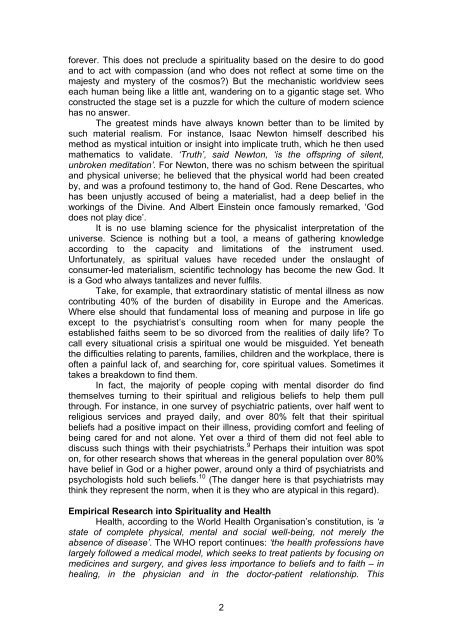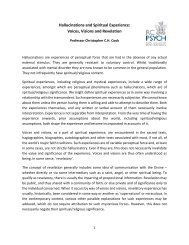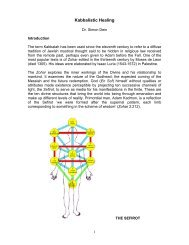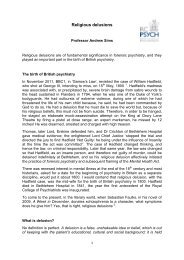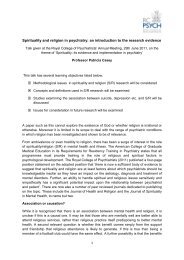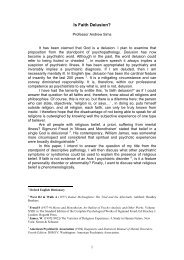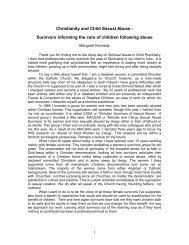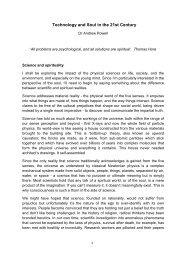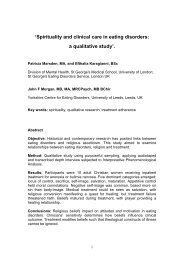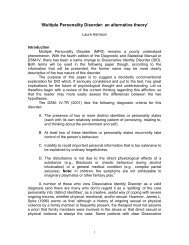Andrew Powell Mental Health and Spirituality
Andrew Powell Mental Health and Spirituality
Andrew Powell Mental Health and Spirituality
Create successful ePaper yourself
Turn your PDF publications into a flip-book with our unique Google optimized e-Paper software.
forever. This does not preclude a spirituality based on the desire to do good<br />
<strong>and</strong> to act with compassion (<strong>and</strong> who does not reflect at some time on the<br />
majesty <strong>and</strong> mystery of the cosmos) But the mechanistic worldview sees<br />
each human being like a little ant, w<strong>and</strong>ering on to a gigantic stage set. Who<br />
constructed the stage set is a puzzle for which the culture of modern science<br />
has no answer.<br />
The greatest minds have always known better than to be limited by<br />
such material realism. For instance, Isaac Newton himself described his<br />
method as mystical intuition or insight into implicate truth, which he then used<br />
mathematics to validate. ‘Truth’, said Newton, ‘is the offspring of silent,<br />
unbroken meditation’. For Newton, there was no schism between the spiritual<br />
<strong>and</strong> physical universe; he believed that the physical world had been created<br />
by, <strong>and</strong> was a profound testimony to, the h<strong>and</strong> of God. Rene Descartes, who<br />
has been unjustly accused of being a materialist, had a deep belief in the<br />
workings of the Divine. And Albert Einstein once famously remarked, ‘God<br />
does not play dice’.<br />
It is no use blaming science for the physicalist interpretation of the<br />
universe. Science is nothing but a tool, a means of gathering knowledge<br />
according to the capacity <strong>and</strong> limitations of the instrument used.<br />
Unfortunately, as spiritual values have receded under the onslaught of<br />
consumer-led materialism, scientific technology has become the new God. It<br />
is a God who always tantalizes <strong>and</strong> never fulfils.<br />
Take, for example, that extraordinary statistic of mental illness as now<br />
contributing 40% of the burden of disability in Europe <strong>and</strong> the Americas.<br />
Where else should that fundamental loss of meaning <strong>and</strong> purpose in life go<br />
except to the psychiatrist’s consulting room when for many people the<br />
established faiths seem to be so divorced from the realities of daily life To<br />
call every situational crisis a spiritual one would be misguided. Yet beneath<br />
the difficulties relating to parents, families, children <strong>and</strong> the workplace, there is<br />
often a painful lack of, <strong>and</strong> searching for, core spiritual values. Sometimes it<br />
takes a breakdown to find them.<br />
In fact, the majority of people coping with mental disorder do find<br />
themselves turning to their spiritual <strong>and</strong> religious beliefs to help them pull<br />
through. For instance, in one survey of psychiatric patients, over half went to<br />
religious services <strong>and</strong> prayed daily, <strong>and</strong> over 80% felt that their spiritual<br />
beliefs had a positive impact on their illness, providing comfort <strong>and</strong> feeling of<br />
being cared for <strong>and</strong> not alone. Yet over a third of them did not feel able to<br />
discuss such things with their psychiatrists. 9 Perhaps their intuition was spot<br />
on, for other research shows that whereas in the general population over 80%<br />
have belief in God or a higher power, around only a third of psychiatrists <strong>and</strong><br />
psychologists hold such beliefs. 10 (The danger here is that psychiatrists may<br />
think they represent the norm, when it is they who are atypical in this regard).<br />
Empirical Research into <strong>Spirituality</strong> <strong>and</strong> <strong>Health</strong><br />
<strong>Health</strong>, according to the World <strong>Health</strong> Organisation’s constitution, is ‘a<br />
state of complete physical, mental <strong>and</strong> social well-being, not merely the<br />
absence of disease’. The WHO report continues: ‘the health professions have<br />
largely followed a medical model, which seeks to treat patients by focusing on<br />
medicines <strong>and</strong> surgery, <strong>and</strong> gives less importance to beliefs <strong>and</strong> to faith – in<br />
healing, in the physician <strong>and</strong> in the doctor-patient relationship. This<br />
2


